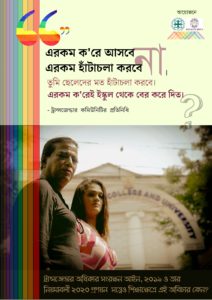Despite a rich cultural tradition of gender-fluidity, the transgender community in India have been stigmatised as a ‘criminal tribe’ through a colonial-era law. The community has struggled for their rights over decades, and only after significant engagement with the judiciary were they finally counted in the population Census of 2011.
It wasn’t until findings of an Expert Committee in 2013 into the discrimination of the transgender community that there was significant legal change. After a Public Interest Litigation, the Supreme Court of India ruled that transgender persons had the right to self-identify as male, female or a third gender. It also brought into law that the constitutional rights to life, dignity and autonomy would include the right to a person’s gender identity and sexual orientation. The government then brought in the ‘Transgender Persons (Protection of Rights) Act 2019 (TG Act)’, and issued the Rules in September 2020, which are used to enforce the act.
But the transgender community has seen little change, and still face discrimination in everyday life.
“The teacher said to my father, ‘Take your son away, keep him somewhere else, I cannot teach him in school. Only if he behaves properly, I’ll be able to teach him in school’. I tried really hard but I was never able to behave ‘properly’. … my walk was different; my voice was different…”
The poster reads: “‘You shouldn’t come looking like this, You shouldn’t walk around like this, You should walk like a boy.’ This is how I would be thrown out of school.” A representative of the transgender community. Why does this injustice continue in Education despite the guarantees in the Transgender (Protection of Rights) Act 2019 and the Rules (2020)?” Credit: Centre for Health and Social Justice.
Discrimination remains
The TG Act and Rules have many provisions, including a simpler process for self-identification, setting up a Welfare Board and a Transgender Protection Cell, and creating separate infrastructure in hospitals, jails, shelter homes, as well as separate washrooms everywhere, yet none of this has been implemented.
“Despite the reading down of Section 377 or the passing of the Transgender (Protection of Rights) Act 2019, we have not received any opportunities or benefits that have been promised to us in law.
The only change is that in forms and documents there’s been the addition of the word “Others” or “Transgender” but these terms really have no benefit for us.”
The disregard of the mandatory Equal Opportunity policy in all establishments leads to continued discrimination against the community in all social settings, including families, neighbourhoods, educational institutions, public places and limits opportunities to find employment. Many in the transgender community have not had access to schooling, and are not able to read the TG Act and know what their legal rights are.
“When we approach the police, their response is, ‘Wait outside; do you expect us to listen to you right away? Are you going to give us instructions?’”
Demanding action for trans rights
The Centre for Health and Social Justice (CHSJ) (partners of Countering Backlash) and the transgender collective Kolkata Rista, led an event in July, sharing findings from a recent scoping study they conducted. The event brought together members of the transgender community along with senior officials from the police department, the health and AIDS Control department, and correctional facilities, to showcase three short films and posters which highlight the discrimination transgender people face in education, healthcare, work, and from the police.
The event started the creation of a support system for the transgender community with the institutions that attended, who must use their power to enact positive social change. Kolkata Rista also launched a community crisis response and support cell with a helpline which will respond to any incident of violence or harassment and discrimination faced by the transgender community in Kolkata. It will include a safe space for shelter and medication or counselling.
The scoping study carried out by CHSJ with people in the transgender community brought out the lack of meaningful change in their situation despite their aspirations for self-improvement. The study also found that key people in the police department, health department and HIV/AIDS prevention programmes who have the power and knowledge to enact change have not yet carried out training for their staff on the TG Act of 2019 and the Rules.
Watching the stories of their own lives and struggles unfold in the films was an emotional experience for the community members. They shared painful experiences of rejection and humiliation and how a lack of opportunities to make changes in their lives affected them. The police officials and those leading AIDS programmes pledged that they would do more to provide meaningful support after watching these films and hearing their stories.
Now, those words must become action, and we must keep a vigilant eye on progress to make sure that rights are realised.
